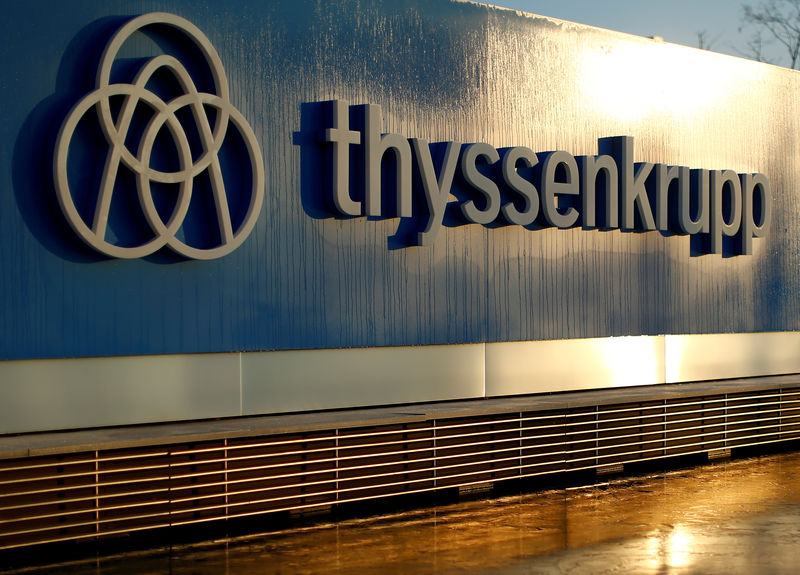By Christoph Steitz and Tom Käckenhoff
FRANKFURT/DUESSELDORF (Reuters) - Thyssenkrupp (DE:TKAG) faces risks ranging from economic uncertainty to cartel fines in 2019, potentially complicating a planned spin-off of the German company's capital goods business which has so far left some investors unconvinced.
Shares in Thyssenkrupp have fallen 26 percent since September when it bowed to long-standing pressure to separate its elevators, car parts and plant engineering from steel, naval vessels and metals distribution, lagging German (GDAXI), European (STOXX) and global stocks (MIWD00000PUS).
While the break-up plan is backed by the Alfried Krupp von Bohlen and Halbach foundation and Cevian, Thyssenkrupp's two biggest shareholders, other investors question whether it will solve the German conglomerate's bigger problems.
"Overall, I still don't see how Thyssenkrupp will get anywhere," said Thomas Hechtfischer, managing director of shareholder advisory group DSW, which represents 1 percent of the group's voting rights at its annual general meeting.
"2019 won't be the only transition year for the group. I suspect there will be quite a few," he said of the turmoil at Thyssenkrupp, whose chief executive and chairman left as a result of the sustained investor disquiet.
GRAPHIC: Thyssenkrupp shares - https://tmsnrt.rs/2SNFN0C
Some analysts say fears of a global economic downturn as well as potential fines over alleged cartel agreements in Germany could also hit Thyssenkrupp at a time of already stretched finances.
"Balance sheets will be an area of focus in a more severe industrial recession scenario. We see Thyssenkrupp as particularly vulnerable," Barclays (LON:BARC) analyst Lars Brorson wrote.
Rating the stock "underweight", Barclays has set a target price of 14.50 euros per Thyssenkrupp share, 10 percent below where its stock was trading on Thursday.
One top-20 shareholder, who declined to be named, said Thyssenkrupp's management still needed to prove that the break-up will result in a smaller, more agile set-up, adding: "Simply announcing a breakup doesn't change anything."
Thyssenkrupp, whose AGM is scheduled for Feb. 1, plans to get most of the break-up work, including a legal separation as well as top management appointments, done this year before shareholders are to approve the split in a year's time.
"The two entities will still be a disparate collection of businesses lacking synergies ... the split entities will continue to present challenges for investors to forecast and value with a likely discount to valuation," Morningstar analyst Denise Molina said in a note.
The main sticking point is uncertainty over Thyssenkrupp's elevator and car parts businesses, the core of the planned spin-off, partly because of an automotive industry downturn.

"The sceptical investor might worry that group management hasn't asked enough difficult questions about how margin expansion and/or order book growth has been achieved," a top-40 shareholder, who also declined to be named, said.